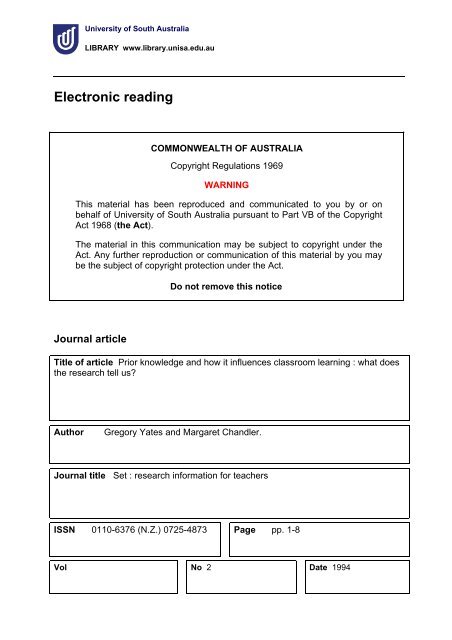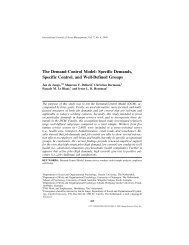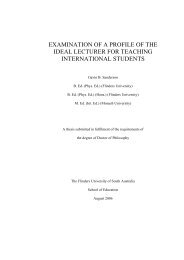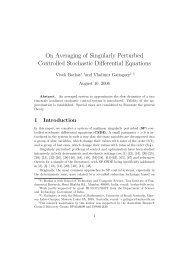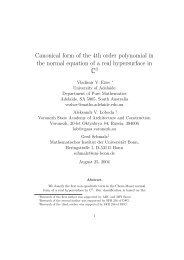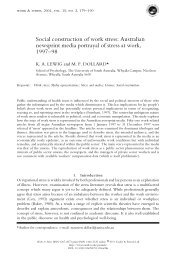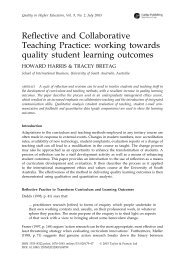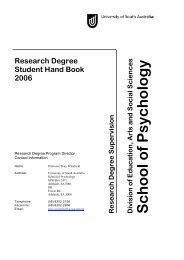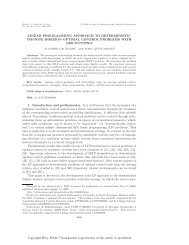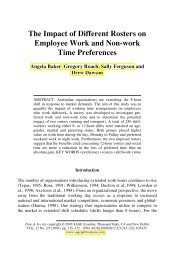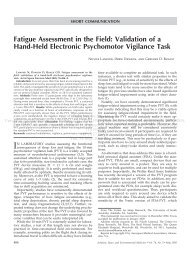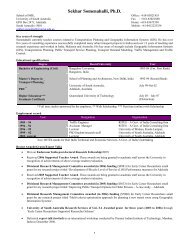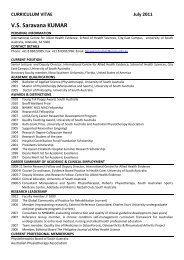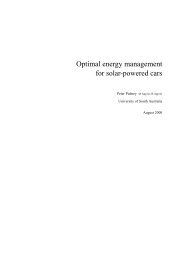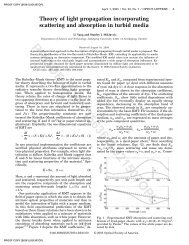Electronic reading - Study at UniSA - University of South Australia
Electronic reading - Study at UniSA - University of South Australia
Electronic reading - Study at UniSA - University of South Australia
You also want an ePaper? Increase the reach of your titles
YUMPU automatically turns print PDFs into web optimized ePapers that Google loves.
<strong>University</strong> <strong>of</strong> <strong>South</strong> <strong>Australia</strong><br />
LIBRARY www.library.unisa.edu.au<br />
<strong>Electronic</strong> <strong>reading</strong><br />
COMMONWEALTH OF AUSTRALIA<br />
Copyright Regul<strong>at</strong>ions 1969<br />
WARNING<br />
This m<strong>at</strong>erial has been reproduced and communic<strong>at</strong>ed to you by or on<br />
behalf <strong>of</strong> <strong>University</strong> <strong>of</strong> <strong>South</strong> <strong>Australia</strong> pursuant to Part VB <strong>of</strong> the Copyright<br />
Act 1968 (the Act).<br />
The m<strong>at</strong>erial in this communic<strong>at</strong>ion may be subject to copyright under the<br />
Act. Any further reproduction or communic<strong>at</strong>ion <strong>of</strong> this m<strong>at</strong>erial by you may<br />
be the subject <strong>of</strong> copyright protection under the Act.<br />
Do not remove this notice<br />
Journal article<br />
Title <strong>of</strong> article Prior knowledge and how it influences classroom learning : wh<strong>at</strong> does<br />
the research tell us?<br />
Author<br />
Gregory Y<strong>at</strong>es and Margaret Chandler.<br />
Journal title Set : research inform<strong>at</strong>ion for teachers<br />
ISSN 0110-6376 (N.Z.) 0725-4873 Page pp. 1-8<br />
Vol No 2 D<strong>at</strong>e 1994
[ number two 1994<br />
Prior Knowledge<br />
and How it Influences Classroom Learning.<br />
Wh<strong>at</strong> does the Research tell us?<br />
Gregory Y<strong>at</strong>es and Margaret Chandler<br />
REVIEW OF THE MANY research projects on<br />
how prior knowledge effects learning. Generally, having<br />
old knowledge, to which new knowledge may be<br />
<strong>at</strong>tached, gre<strong>at</strong>ly assists learning the new.<br />
W<br />
HY DO SOME CHILDREN learn quickly,<br />
with little apparent effort or pain? Why do<br />
some students need far less instruction or<br />
inducement to 1earn than is required to motiv<strong>at</strong>e<br />
others? Traditional answers <strong>of</strong>ten refer to intelligence,<br />
learning style or personality, or perhaps allude vaguely to<br />
factors such as home background and achievement needs.<br />
Our <strong>reading</strong> in the research liter<strong>at</strong>ure <strong>of</strong> cognitive psychology<br />
has convinced us th<strong>at</strong> knowledge theory arrives <strong>at</strong> a<br />
very powerful and unifying basic idea. We can st<strong>at</strong>e, or<br />
perhaps overst<strong>at</strong>e, this idea in the following blunt manner:<br />
Prior knowledge is the major determinant <strong>of</strong> capability,<br />
capacity, disposition, and facility in children's<br />
classroom learning.<br />
This simple, almost 'obvious', notion turns out to have<br />
remarkable implic<strong>at</strong>ions bringing new insights on intelligence,<br />
mental str<strong>at</strong>egies, problem solving, individual differences,<br />
instructional effectiveness, and teacher-student<br />
interactions.<br />
Research Findings<br />
Research into autom<strong>at</strong>ic and controlled mental processes<br />
M ental processes can be either autom<strong>at</strong>ic or controlled.<br />
A fundamental finding <strong>of</strong> modern cognitive psychology<br />
is th<strong>at</strong> complex human functioning hinges upon<br />
developing autom<strong>at</strong>ic elementary inform<strong>at</strong>ion processing<br />
skills. Whenever we pick up a book to read, or drive a car<br />
up the road, or begin writing sentences on paper or a word<br />
processor, or even make a pot <strong>of</strong> tea, we rely totally upon<br />
the autom<strong>at</strong>ic way we do sets <strong>of</strong> previously acquired subskills.<br />
Allowing some behavioural processes to become<br />
autom<strong>at</strong>ic enables other processes to become consciously<br />
controlled, th<strong>at</strong> is, to occupy mental 'centre stage'.<br />
Autom<strong>at</strong>ic processing involves minimal effort, virtually<br />
no <strong>at</strong>tention, and needs no practice. Such processes cannot<br />
be unlearned and are not subject to normal voluntary control.<br />
For example, it is no trouble to ride a bicycle 20 years<br />
after the last time, and it is almost impossible to hear the<br />
phrase 2 + 2 without thinking = 4. Indeed, to draw <strong>at</strong>tention<br />
deliber<strong>at</strong>ely to the autom<strong>at</strong>ed functioning reduces per-<br />
I<br />
formance. For example, to focus deliber<strong>at</strong>ely on individual<br />
letters in <strong>reading</strong>, as a pro<strong>of</strong>-reader does, considerably<br />
reduces <strong>reading</strong> speed and comprehension.<br />
Controlled inform<strong>at</strong>ion processing, on the other hand,<br />
entails large amounts <strong>of</strong> conscious <strong>at</strong>tention and effort. For<br />
example, when we approach any new situ<strong>at</strong>ion or task we<br />
have to focus carefully, identify cn.icial cues, assign priorities,<br />
and decide on how to respond. However, as we gain<br />
experience through active practice we learn various mental<br />
short-cuts and far less <strong>at</strong>tention is required. With extended<br />
practice, we build up skill and the task becomes rel<strong>at</strong>ively<br />
effortless, more autom<strong>at</strong>ic, and perhaps more enjoyable.<br />
But the amount <strong>of</strong> practice required to achieve autom<strong>at</strong>icity<br />
may be considerable. Unfortun<strong>at</strong>ely the time<br />
needed is <strong>of</strong>ten underestim<strong>at</strong>ed or unacknowledged in<br />
teaching and learning. One researcher says 'It requires <strong>at</strong><br />
least 100 hours <strong>of</strong> learning and practice to acquire any significant<br />
cognitive skill to a reasonable degree <strong>of</strong> pr<strong>of</strong>iciency.'<br />
Autom<strong>at</strong>ed functioning may require thousands <strong>of</strong><br />
practice trials, for example, it is estim<strong>at</strong>ed th<strong>at</strong> achieving<br />
total autom<strong>at</strong>ic word recognition requires somewhere<br />
around 10,000 exposures to individual words.<br />
A good deal <strong>of</strong> early educ<strong>at</strong>ion in language, <strong>reading</strong> and<br />
m<strong>at</strong>hem<strong>at</strong>ics is aimed <strong>at</strong> making the child's mental oper<strong>at</strong>ions<br />
more autom<strong>at</strong>ic, less effortful and more enjoyable. It<br />
is known, for example, th<strong>at</strong> practice in comput<strong>at</strong>ion and<br />
estim<strong>at</strong>ion skills facilit<strong>at</strong>es the development <strong>of</strong> m<strong>at</strong>hem<strong>at</strong>ical<br />
reasoning. Research with Asian children has established<br />
th<strong>at</strong> high levels <strong>of</strong> practice on the abacus are associ<strong>at</strong>ed<br />
with both enhanced short-term memory for numbers, and<br />
with improved skills in mental arithmetic. It has been<br />
repe<strong>at</strong>edly documented th<strong>at</strong> failure to develop autom<strong>at</strong>ic<br />
decoding is one <strong>of</strong> the central characteristics <strong>of</strong> many poor<br />
readers who are thus forced to devote an inordin<strong>at</strong>e level<br />
<strong>of</strong> effort to deciphering print.<br />
Research into learning processes<br />
Existing knowledge has a powerful influence upon a person's<br />
ability to learn new m<strong>at</strong>erial. Learning occurs considerably<br />
more rapidly, efficiently and meaningfully if a new<br />
input can be rel<strong>at</strong>ed to existing knowledge. Some <strong>of</strong> the
esearch illustr<strong>at</strong>ing this point is particularly interesting.<br />
For example in different research projects, (a) American<br />
college students remembered more from <strong>reading</strong> about the<br />
British game <strong>of</strong> cricket once the rel<strong>at</strong>ionship <strong>of</strong> cricket to<br />
baseball was made explicit; (b) adult soccer enthusiasts<br />
were able to recall random numbers presented in the form<br />
<strong>of</strong> game scores more effectively than could non-enthusiasts;<br />
(c) young children's prior knowledge <strong>of</strong> toys strongly<br />
predicted their scores on a comprehension and recall test<br />
following exposure to a short narr<strong>at</strong>ive involving these<br />
toys; and (d) high school students were able to assimil<strong>at</strong>e<br />
and recall the details <strong>of</strong> algebraic story problems far more<br />
readily when those problems conformed to the specific<br />
story types with which they were familiar.<br />
Although possessing relevant knowledge will <strong>of</strong>ten<br />
make a person more interested in particular types <strong>of</strong> inform<strong>at</strong>ion,<br />
the impact <strong>of</strong> knowledge on learning cannot be<br />
<strong>at</strong>tributed simply to enhanced interest or to paying more<br />
<strong>at</strong>tention, since these motiv<strong>at</strong>ional factors were <strong>of</strong>ten carefully<br />
controlled within the research designs. Although<br />
interests, incentive, and motiv<strong>at</strong>ion all clearly influence<br />
learning, prior knowledge has been shown to have strong<br />
effects even after accounting for these variables.<br />
Learning has to be seen as a highly cumul<strong>at</strong>ive process.<br />
The more one knows, the more likely one is to pr<strong>of</strong>it from<br />
rel<strong>at</strong>ed experience or instruction. But wh<strong>at</strong> processes are<br />
involved? We now appreci<strong>at</strong>e th<strong>at</strong> the learner with salient<br />
prior knowledge is able to employ highly effective acquisition<br />
str<strong>at</strong>egies such as organis<strong>at</strong>ion, chunking and elabor<strong>at</strong>ion,<br />
and so becomes able to assimil<strong>at</strong>e rel<strong>at</strong>ively high<br />
levels <strong>of</strong> inform<strong>at</strong>ion input without suffering overload<br />
effects. Knowledgeable learners can process more inform<strong>at</strong>ion,<br />
<strong>at</strong> a deeper mental processing level, and can do so in<br />
less time. For example, in one study it was shown th<strong>at</strong><br />
existing knowledge enabled readers to mentally integr<strong>at</strong>e<br />
sentences and paragraphs and so comprehend higher level<br />
themes (i.e., the 'big picture') quickly.<br />
Plainly, being able to access relevant knowledge<br />
reduces the 'cognitive strain' th<strong>at</strong> a learner needs to<br />
process incoming inform<strong>at</strong>ion, in addition, knowledge is<br />
likely to have emotional pay<strong>of</strong>fs, perhaps through helping<br />
a learner to achieve confidence, autonomy, purpose, and<br />
self-direction. Within the classroom, prior knowledge helps<br />
a student become less dependent upon instruction, more<br />
familiar with the 'big picture', more able to cope with independent<br />
assignments, and more able to assess his or her<br />
own progress.<br />
Research into schemas and their acquisition<br />
Cognitive psychologists have found it useful to picture<br />
knowledge in the mind as sets <strong>of</strong> organised and interlinked<br />
mental schemas. You might think <strong>of</strong> schemas as organised<br />
groups <strong>of</strong> concepts. As we experience the world, we invariably<br />
<strong>at</strong>tempt to rel<strong>at</strong>e our experiences to the schemas we<br />
already have. For example, to read 'Lorraine s<strong>at</strong> down and<br />
stared <strong>at</strong> the menu' instructs the brain to activ<strong>at</strong>e its schema<br />
concerning restaurants. Once activ<strong>at</strong>ed, the schema<br />
becomes the basis for comprehension, expect<strong>at</strong>ion, inference,<br />
and learning. Some theorists suggest th<strong>at</strong> once<br />
schemas are activ<strong>at</strong>ed certain 'slots' are opened and the<br />
mind is primed to receive certain types <strong>of</strong> inform<strong>at</strong>ion. For<br />
example, our reader is now expecting Lorraine's behaviour<br />
to be consistent with ordering and e<strong>at</strong>ing a meal, and having<br />
to pay for it.<br />
In one fascin<strong>at</strong>ing experiment students were asked to<br />
listen to fourteen st<strong>at</strong>ements, one <strong>of</strong> which was, 'First, you<br />
arrange the items into different groups. Of course, one pile may<br />
be sufficient depending on how much there is to do'. The students<br />
found it difficult to recall this inform<strong>at</strong>ion and they<br />
r<strong>at</strong>ed the whole passage as rel<strong>at</strong>ively incomprehensible.<br />
However, a second group <strong>of</strong> students were informed in<br />
advance th<strong>at</strong> the st<strong>at</strong>ements were concerned with washing<br />
clothes. A washing schema was activ<strong>at</strong>ed and these<br />
recalled a good deal <strong>of</strong> the inform<strong>at</strong>ion and found the<br />
experience comprehensible. Getting the washing cue after<br />
hearing the passage failed to have any effect. In order to<br />
understand and learn effectively, it is <strong>of</strong> considerable value<br />
to be equipped with relevant schemas, and to have this<br />
knowledge activ<strong>at</strong>ed <strong>at</strong> the very moment when learning is<br />
to take place.<br />
This point helps to explain why repetition is <strong>of</strong>ten so<br />
important (but <strong>of</strong>ten overlooked) in meaningful learning.<br />
You may need to come across inform<strong>at</strong>ion perhaps two,<br />
three, or more times before the essential schema is 'in<br />
For example, research into how people read complex<br />
text reveals th<strong>at</strong> repe<strong>at</strong>ed <strong>reading</strong>s allow the reader<br />
(a) to refocus <strong>at</strong>tention onto relevant r<strong>at</strong>her than peripheral<br />
details, (b) to reorganise ideas and make connections with<br />
wh<strong>at</strong> is already known, and (c) to reword the essential<br />
inform<strong>at</strong>ion in the reader's own language r<strong>at</strong>her than to<br />
regurgit<strong>at</strong>e the exact words given in the text. A number <strong>of</strong><br />
studies now indic<strong>at</strong>e th<strong>at</strong> when people, even 'well-educ<strong>at</strong>ed'<br />
ones, are asked to read text containing rich levels <strong>of</strong><br />
inform<strong>at</strong>ion, they are usually unaware th<strong>at</strong> a single <strong>reading</strong><br />
is insufficient for genuine understanding. A Canadian<br />
study found th<strong>at</strong> university students grossly over-estim<strong>at</strong>ed<br />
how well they could answer comprehension questions<br />
after a single <strong>reading</strong>.<br />
Acquiring and using schemas. Studies with upper primary<br />
school children have found th<strong>at</strong> academically successful<br />
students are highly adept in using their own<br />
schemas when <strong>at</strong>tempting to learn new inform<strong>at</strong>ion. These<br />
students used their existing conceptual knowledge to gener<strong>at</strong>e<br />
precise elabor<strong>at</strong>ions. But the less successful students,<br />
even though they did not lack appropri<strong>at</strong>e conceptual<br />
knowledge, were generally unaware th<strong>at</strong> using it would<br />
help them to learn. They did not appreci<strong>at</strong>e how new inform<strong>at</strong>ion<br />
can become far more meaningful when consciously<br />
rel<strong>at</strong>ed to wh<strong>at</strong> is already known. The good news is th<strong>at</strong><br />
these students responded well to cognitive training sessions.<br />
These sessions were in the techniques <strong>of</strong> deliber<strong>at</strong>ely<br />
gener<strong>at</strong>ing meaningful elabor<strong>at</strong>ions.<br />
Think <strong>of</strong> schemas as high.er level orgarlising concepts<br />
which can actually be acquired (or substantially refined)<br />
through direct teaching and instruction. For example, it has<br />
been found th<strong>at</strong> within geography lessons, students can be<br />
taught a n<strong>at</strong>ion schema which aids them in <strong>reading</strong> about<br />
different countries, th<strong>at</strong> primary students can be easily<br />
taught basic principles <strong>of</strong> expository discourse, and th<strong>at</strong> language<br />
arts students can be taught an effective story schema<br />
for comprehending narr<strong>at</strong>ive sequences. In one study with<br />
university science undergradu<strong>at</strong>es significant improvements<br />
in <strong>reading</strong>, understanding, and recalling difficult scientific<br />
papers were found after the students -had<br />
assimil<strong>at</strong>ed an eight-page written summary <strong>of</strong> the principles<br />
<strong>of</strong> journal article construction. Findings such as these<br />
indic<strong>at</strong>e how important it is for teachers to point out<br />
explicitly the organised (and schem<strong>at</strong>ic) n<strong>at</strong>ure <strong>of</strong> knowledge,<br />
particularly the way knowledge is recorded and<br />
used within specific disciplines.<br />
Can schemas be acquired from abstract language? One<br />
specific finding is <strong>of</strong> particular relevance to teachers. The<br />
human mind cannot genuinely assimil<strong>at</strong>e rel<strong>at</strong>ively new<br />
verbal inform<strong>at</strong>ion in the form <strong>of</strong> abstract dictionary-type<br />
st<strong>at</strong>ements. It is perhaps impossible for the mind to understand<br />
higher level principles, abstractions, or definitions,<br />
without being shown how to rel<strong>at</strong>e the abstract st<strong>at</strong>ement<br />
to specific positive examples, instances or actual cases. The<br />
use <strong>of</strong> a good range <strong>of</strong> concrete examples is absolutely critical.<br />
Attempting to learn complex verbal propositions in the
absence <strong>of</strong> examples might <strong>at</strong> best produce superficial<br />
learning (wh<strong>at</strong> cognitive psychologists refer to as inert<br />
knowledge). As teachers should note th<strong>at</strong> schema<br />
form<strong>at</strong>ion is enhanced dram<strong>at</strong>ically when learners are<br />
prompted to consider a range <strong>of</strong> positive cases and examples<br />
th<strong>at</strong> vary widely on irrelevant <strong>at</strong>tributes. Only in this<br />
way can the mind begin to identify deeper conceptual<br />
properties. As a direct example <strong>of</strong> the power <strong>of</strong> this effect<br />
you might like to repe<strong>at</strong> the minor experiment we tried out<br />
on our colleagues as described in Appendix A.<br />
Mental models, analogies, and metaphors<br />
As learners encounter complex m<strong>at</strong>erials (such as in science,<br />
mechanics, higher m<strong>at</strong>hem<strong>at</strong>ics, st<strong>at</strong>istics and computing)<br />
they will benefit considerably from any<br />
inform<strong>at</strong>ion enabling them to construct mental models <strong>of</strong><br />
the complex subject m<strong>at</strong>ter. A mental model consists <strong>of</strong><br />
schem<strong>at</strong>a, but in addition includes inform<strong>at</strong>ion about how<br />
crucial elements interact or oper<strong>at</strong>e together as a system.<br />
For example, it is absolutely crucial for your survival th<strong>at</strong><br />
your car mechanic possesses a sophistic<strong>at</strong>ed mental model<br />
<strong>of</strong> hydraulic braking systems. Models play an essential role<br />
in helping a learner appraise the importance <strong>of</strong> different<br />
items <strong>of</strong> inform<strong>at</strong>ion, and in deciding which inform<strong>at</strong>ion to<br />
focus upon, and which to ignore.<br />
It is now known th<strong>at</strong> in any complex learning the<br />
human mind n<strong>at</strong>urally, and almost inevitably, l<strong>at</strong>ches on to<br />
any inform<strong>at</strong>ion source which enables 'runnable' models to<br />
be constructed. Excellent teachers may capitalise on this<br />
trait by doing things such as providing overviews, using<br />
advance organisers, using visual displays, spending time<br />
analysing flow diagrams, or by the careful use <strong>of</strong> analogies<br />
and metaphors.<br />
Well chosen metaphors and analogies can be highly<br />
effective learning devices. The heart might be described as<br />
a pump, the living cell as a cancer as a slow explosion,<br />
an ant colony as a single organism, a computer screen<br />
as a window, and so on. Obviously such metaphors have<br />
limit<strong>at</strong>ions. However, <strong>at</strong> the outset <strong>of</strong> learning, they can<br />
help a learner construct an elementary model <strong>of</strong>.a complex<br />
event or process. In this fashion, knowledge acquired earlier<br />
in one domain may, if appropri<strong>at</strong>ely activ<strong>at</strong>ed, assist in<br />
effective learning in a different domain. Indeed the most<br />
effective analogies are ones th<strong>at</strong> link together two remarkably<br />
different, r<strong>at</strong>her than closely rel<strong>at</strong>ed, phenomena. For<br />
example, one group <strong>of</strong> researchers found th<strong>at</strong> students'<br />
understanding <strong>of</strong> the concept <strong>of</strong> st<strong>at</strong>istical mean was<br />
enhanced when a balance beam was used by way <strong>of</strong> analogy.<br />
A good deal <strong>of</strong> research has found th<strong>at</strong> children think<br />
n<strong>at</strong>urally using metaphors and analogies. For example,<br />
beginning readers will n<strong>at</strong>urally rel<strong>at</strong>e unfamiliar words to<br />
words they do know. In one remarkable study children as<br />
young as two years were able to reason via analogy, provided<br />
they were given highly specific guidance as to how<br />
to employ their earlier experiences in a new context.<br />
However, labor<strong>at</strong>ory studies with older children and<br />
adults have shown th<strong>at</strong> although individuals may appear<br />
on the surface to readily understand simple analogies, they<br />
have remarkable difficulties in actually using 'obvious'<br />
analogies in new problem solving contexts. It appears th<strong>at</strong><br />
analogies are things we easily 'see', but only after having<br />
the 'obvious' rel<strong>at</strong>ionships pointed out to us. To put this<br />
another way, the success <strong>of</strong> analogies depends directly on<br />
the n<strong>at</strong>ure <strong>of</strong> the instruction, prompts and hints given to<br />
the learner. We cannot stress this point too strongly: It is<br />
not sufficient for a teacher to simply mention an analogy,<br />
for example, You can tiunk<strong>of</strong> the heart as a pump. The specific<br />
analogous rel<strong>at</strong>ionships need to be made explicit and<br />
openly discussed for knowledge transfer to take place.<br />
Excellent teachers n<strong>at</strong>urally develop a repertoire <strong>of</strong> salient<br />
analogies and the research clearly valid<strong>at</strong>es this practice.<br />
Research in solving<br />
In recent years, two major theories <strong>of</strong> problem solving have<br />
received support in cognitive research. The mental skills<br />
approach suggests various str<strong>at</strong>egic ways in which individuals<br />
can learn to improve thinking and problem solving,<br />
such as elimin<strong>at</strong>ing distractions, focusing <strong>at</strong>tention, experimenting<br />
with different ways <strong>of</strong> formul<strong>at</strong>ing a problem,<br />
monitoring goals, gener<strong>at</strong>ing altern<strong>at</strong>ives, and testing these<br />
in some logical manner. The educ<strong>at</strong>ional value <strong>of</strong> this<br />
advice has been documented in numerous ways with both<br />
normal and '<strong>at</strong>-risk' children. The notion th<strong>at</strong> children and<br />
adults can learn to apply generalised cognitive and<br />
metacognitive str<strong>at</strong>egies is now widely accepted.<br />
The knowledge theory approach has, however, in recent<br />
years documented an interesting phenomenon: the more<br />
expert people become <strong>at</strong> solving problems (within a given<br />
domain) the less they use general problem-solving skills.<br />
Expert problem solvers simply do not behave as the mental<br />
skills approach recommends they should. Instead, they<br />
have learned to use their extensive knowledge base about a<br />
given topic to interpret new problems autom<strong>at</strong>ically as<br />
reformul<strong>at</strong>ions <strong>of</strong> old ones. This phenomenon was initially<br />
studied in superior chess players, but has now been<br />
observed in computing, physics, economics, electronics,<br />
music, medical diagnosis, and classroom teaching.<br />
Generalised thinking and problem-solving skills are <strong>of</strong><br />
value when encountering an unfamiliar topic. However, as<br />
people become more skilful (i.e., expert-like) their thinking<br />
becomes more closely <strong>at</strong>tuned to the constraints <strong>of</strong> the<br />
problems to be solved, and especially to the need to gener<strong>at</strong>e<br />
successful solutions. Non-productive divergence can be<br />
toler<strong>at</strong>ed only <strong>at</strong> the outset and a point is reached where<br />
the use <strong>of</strong> general str<strong>at</strong>egies becomes wasteful and counterproductive.<br />
Thus, the skilful problem solver (within a<br />
given domain) rapidly moves away from applying generalised<br />
mental str<strong>at</strong>agems and develops domain-specific<br />
p<strong>at</strong>tern-recognition skills. These critical encoding skills<br />
enable stored knowledge to be brought to bear rapidly on<br />
new problems and thus enable quality solutions to be<br />
reached.<br />
Although experts engage in very fast encoding and<br />
understanding processes as they encounter problems, they<br />
do not always try to solve problems very quickly. Experts,<br />
in contrast to novices, tend to be highly sensitive to the<br />
level <strong>of</strong> difficulty <strong>of</strong> any given problem. Thus they spend<br />
more time examining the problem, and will resist arriving<br />
<strong>at</strong> impulsive, facile conclusions. They readily discrimin<strong>at</strong>e<br />
problems they can solve easily from those th<strong>at</strong> demand<br />
more time, <strong>at</strong>tention, or further inform<strong>at</strong>ion. The expert's<br />
knowledge base is used to gre<strong>at</strong> advantage in forming<br />
these metacognitive discrimin<strong>at</strong>ions.<br />
Research in child development and the emergence <strong>of</strong><br />
literacy skills<br />
A significant body <strong>of</strong> developmental research now clearly<br />
indic<strong>at</strong>es th<strong>at</strong> a large number <strong>of</strong> age-rel<strong>at</strong>ed changes are<br />
directly <strong>at</strong>tributable to growth in the knowledge base.<br />
These changes are in perspective taking, grouping and<br />
classific<strong>at</strong>ion skills, depth (elabor<strong>at</strong>ion) in encoding, memory<br />
str<strong>at</strong>egies, oper<strong>at</strong>ional intelligence, problem solving,<br />
verbal facility, inferential processing, and writing facility.<br />
Recent studies in how children acquire scientific concepts<br />
in biology and astronomy indic<strong>at</strong>e th<strong>at</strong> their reasoning<br />
within these areas is more closely constrained by their<br />
available knowledge than by their age level or lQ.<br />
In essence, a good deal <strong>of</strong> the many n<strong>at</strong>ural differences<br />
we detect in the thinking processes <strong>of</strong> younger and older<br />
children turn out to rel<strong>at</strong>e directly to the fact th<strong>at</strong> older<br />
children kndw more. When age differences in learning do
emerge, they are <strong>of</strong>ten the n<strong>at</strong>ural consequences <strong>of</strong> developments<br />
in the knowledge base. When we ask children to<br />
perform tasks th<strong>at</strong> do not rely on activ<strong>at</strong>ing prior knowledge<br />
then age differences are typically not there. It is now<br />
apparent th<strong>at</strong> earlier research in developmental psychology<br />
completely overlooked the importance <strong>of</strong> the knowledge<br />
base in inform<strong>at</strong>ion processing and thinking.<br />
Research in <strong>reading</strong> and literacy skills has <strong>of</strong>ten found<br />
evidence for prior knowledge effects. For example, (a)<br />
phonological (i.e., sound/symbol) knowledge in<br />
preschoolers will predict the subsequent achievement <strong>of</strong><br />
basic <strong>reading</strong> skills; (b) word knowledge and decoding<br />
measures typically predict <strong>reading</strong> comprehension abilities;<br />
(c) the understanding <strong>of</strong> devices such as metaphor and<br />
simile has been shown to depend upon relevant vocabulary<br />
knowledge; and (d) children write more and with far<br />
gre<strong>at</strong>er goal-orient<strong>at</strong>ion, coherence, and enjoyment when<br />
asked to write upon topics about which they possess relevant<br />
background knowledge. Several studies now indic<strong>at</strong>e<br />
th<strong>at</strong> children's comprehension and accur<strong>at</strong>e recall <strong>of</strong> specific<br />
<strong>reading</strong> m<strong>at</strong>erial can be more strongly predicted from<br />
measures <strong>of</strong> prior knowledge than from standardised test<br />
measures <strong>of</strong> generalised <strong>reading</strong> ability.<br />
Discussion: Key Issues in Applying<br />
Knowledge Theory<br />
Knowledge and Intelligence<br />
p until quite recently, psychologists <strong>of</strong>ten believed th<strong>at</strong><br />
U intelligence could and should be assessed using<br />
'knowledge free' instruments. Intelligence tests were<br />
meant originally to measure the capacity <strong>of</strong> the mental<br />
muscle itself, whereas achievement tests would indic<strong>at</strong>e<br />
the extent to which this capacity manifested itself in literacy<br />
and numeracy. But in actual practice, the distinction<br />
between intelligence and achievement never became clear.<br />
In the verbal and m<strong>at</strong>hem<strong>at</strong>ical domains in particular, it<br />
became impossible to say whether an item was measuring<br />
achievement or intelligence. This facet was well known to a<br />
number <strong>of</strong> researchers right back in the 1920s. It just took<br />
us a while to appreci<strong>at</strong>e its significance.<br />
Modern cognitive theory helps to completely redefine<br />
the concept <strong>of</strong> intelligence. We now appreci<strong>at</strong>e th<strong>at</strong> people<br />
behave intelligently because <strong>of</strong> the knowledge they possess.<br />
The intelligent mind is one with a potentially rich<br />
supply <strong>of</strong> pre-existing knowledge. Within relevant contexts,<br />
knowledge can be activ<strong>at</strong>ed quickly to bear upon<br />
new experiences, to promote mental understanding and<br />
elabor<strong>at</strong>ion, to identify and make sense out <strong>of</strong> strange p<strong>at</strong>terns,<br />
to recognise familiar elements, and to suggest viable<br />
response options. Hence knowledge is seen as the major<br />
factor th<strong>at</strong> enables people to function and appear as intelligent,<br />
even on carefully prepared standardised tests. This<br />
view, th<strong>at</strong> possessing knowledge enables you to become<br />
intelligent, contrasts markedly from earlier psychometric<br />
views.<br />
It is easily overlooked th<strong>at</strong> the IQ-type tests in common<br />
usage are largely measures <strong>of</strong> achievement and existing<br />
knowledge within restricted domains. Hence it is not surprising<br />
to find th<strong>at</strong> short forms <strong>of</strong> IQ tests retain the vocabulary<br />
and general knowledge items. In fact, IQ tests do a<br />
poor job <strong>of</strong> predicting performance on tasks upon which<br />
prior knowledge is unlikely to differenti<strong>at</strong>e individuals, for<br />
example, learning arbitrary associ<strong>at</strong>ions, and doing labor<strong>at</strong>ory<br />
tasks. Furthermore, IQ d<strong>at</strong>a are unrel<strong>at</strong>ed to complex<br />
mental performances where individuals have developed<br />
considerable expertise or where successful thinking<br />
depends on familiar routines and stored knowledge built<br />
up over years. This point was illustr<strong>at</strong>ed dram<strong>at</strong>ically in<br />
Ceci and Liker's study reported in 'A Day <strong>at</strong> the Races' in<br />
4.<br />
set No. 1, item 11, 1994. Racegoers with IQs in the 80s were<br />
using mental models <strong>of</strong> amazing complexity to (accur<strong>at</strong>ely)<br />
pick horses and odds and the researchers say, 'wh<strong>at</strong>ever it<br />
is th<strong>at</strong> an IQ test measures, it is not the ability to engage in<br />
complex forms <strong>of</strong><br />
reasoning.'<br />
Ccci and Liker's d<strong>at</strong>a are certainly not unique: there are<br />
many recorded examples <strong>of</strong> genuinely intelligent behaviour<br />
on the part <strong>of</strong> individuals who have difficulty on IQtype<br />
measures. In real-life relevant knowledge, experience,<br />
and repe<strong>at</strong>ed practice will readily outweigh global factors<br />
such as IQ. However, in school contexts a child's IQ score<br />
represents an approxim<strong>at</strong>ion <strong>of</strong> his or her general knowllevel,<br />
<strong>at</strong> least for certain academic topics.<br />
Are prior knowledge effects obvious?<br />
The idea th<strong>at</strong> learning is influenced by wh<strong>at</strong> a person<br />
already knows is perhaps initially unsurprising. But wh<strong>at</strong><br />
is surprising is the power and subtlety <strong>of</strong> this effect. Once a<br />
learner's <strong>at</strong>tention is secured, the impact <strong>of</strong> existing knowledge<br />
on learning is likely to outweigh factors such as<br />
incentive, cognitive style, locus <strong>of</strong> control, personality or<br />
disposition. The research has now established th<strong>at</strong> prior<br />
knowledge constitutes a highly salient factor explaining<br />
why some students learn more from the same experience<br />
than others, even once variables such as JQ and socio-econornic<br />
st<strong>at</strong>us are controlled.<br />
The impact <strong>of</strong> prior knowledge on mental processing<br />
whilst learning, <strong>at</strong> the moment <strong>of</strong> acquisition, is not obvious.<br />
The deeper processing th<strong>at</strong> knowledge permits is<br />
essentially hidden from a teacher's view.<br />
Prior knowledge allows a learner to imbue an experience<br />
with gre<strong>at</strong>er meaning, resulting in higher levels <strong>of</strong><br />
inferential processing and a gre<strong>at</strong>er ability to <strong>at</strong>tend to the<br />
crucial elements <strong>of</strong> the experience. In a classroom study,<br />
Ellen Gagne and her colleagues found th<strong>at</strong> children who<br />
knew more about a topic to begin with, remembered more<br />
<strong>of</strong> the lesson a month l<strong>at</strong>er, rel<strong>at</strong>ive to their low-knowledge<br />
classm<strong>at</strong>es. This effect was apparent even though the lowknowledge<br />
students had initially been allowed more time<br />
to study the m<strong>at</strong>erial to bring them to mastery level.<br />
Prior knowledge effects can be subtle and totally unobvious.<br />
As adults we r<strong>at</strong>e a task as 'easy' or 'difficult' largely<br />
because we are familiar or unfamiliar with the actual elements<br />
<strong>of</strong> th<strong>at</strong> task; we are reporting how autom<strong>at</strong>ic the task<br />
is, r<strong>at</strong>her than other more objective fe<strong>at</strong>ures. As a consequence<br />
we have almost no insight into the difficulty level<br />
<strong>of</strong> acquiring basic skills — which we expect <strong>of</strong> our children<br />
in the early school years. We fail to appreci<strong>at</strong>e th<strong>at</strong> achieving<br />
'simple' skills such as counting and one-to-one correspondence<br />
involves mastering a complex sequence <strong>of</strong><br />
knowledge elements and production skills. Further, as<br />
adults we are unlikely to appreci<strong>at</strong>e how our ability to<br />
acquire new knowledge rel<strong>at</strong>es directly to pieces <strong>of</strong> prior<br />
knowledge acquired years, even decades, earlier.<br />
Is knowledge a threshold factor?<br />
How much knowledge do we need? Can getting knowledge<br />
be self-defe<strong>at</strong>ing? Can we have too much 'up there',<br />
undermining mental efficiency? Does knowing too much<br />
make you incapable <strong>of</strong> making decisions? Well, there is no<br />
serious evidence to suggest th<strong>at</strong> learning too much can<br />
'clog' your mind. Whereas short-term memory can be<br />
rapidly overloaded, long-term memory does not appear to<br />
possess limits. Knowledge forces you to recognise complexities,<br />
perhaps forcing you to think more carefully<br />
r<strong>at</strong>her than act in a blind or impulsive manner. But reflectiveness<br />
(in contrast to impulsiveness) is a trait more likely<br />
to be associ<strong>at</strong>ed with increased, r<strong>at</strong>her than decreased,<br />
mental efficiency.
The human mind simply doesnot, and probably cannot,<br />
acquire new facts, propositions or vocabulary items ad<br />
nauseam. A knowledgeable person not only knows a large<br />
number <strong>of</strong> concepts and facts but also knows highly effective<br />
ways <strong>of</strong> accessing, organising, classifying, rearranging,<br />
and comparing these elements. The research into expertise<br />
clearly supports the view th<strong>at</strong> enhanced mental processing<br />
is associ<strong>at</strong>ed with the accumul<strong>at</strong>ion <strong>of</strong> an extensive knowledge<br />
base.<br />
Three conditions where existing knowledge can inhibit<br />
new learning<br />
Memory interference has been researched extensively.<br />
Inform<strong>at</strong>ion already in the head may become confused or<br />
interfere with a new experience. However, this interference<br />
is generally weak where the context is meaningful. Several<br />
studies have even demonstr<strong>at</strong>ed th<strong>at</strong> possessing and using<br />
a strong prior knowledge base (rendering things more<br />
meaningful) is a very effective defence against interference<br />
effects. In other words, a little or insecure knowledge certainly<br />
may become a source <strong>of</strong> interference, but the more<br />
one knows about a new input, the less it will suffer memory<br />
distortion, interference or loss. 'A little learning is a<br />
dangerous thing. Drink deep...'<br />
Misconception effects are a subtle but especially interesting<br />
phenomenon. When a learner approaches a new topic but<br />
already has faulty beliefs or knowledge based on misinform<strong>at</strong>ion,<br />
any new inform<strong>at</strong>ion is likely to be interpreted in<br />
terms <strong>of</strong> the initial misconception. Faulty prior beliefs can<br />
be highly resistant to change. Along with other n<strong>at</strong>ural<br />
biases, faulty knowledge appears to be particularly strong<br />
when we are asked to learn oi to make decisions about rel<strong>at</strong>ively<br />
unfamiliar events. Classroom research has indic<strong>at</strong>ed<br />
th<strong>at</strong> if students possess misconceptions which are not<br />
specifically <strong>at</strong>tacked within the instructional process, then<br />
the original notions persist, with students being unaware<br />
<strong>of</strong> the discrepancies between their existing ideas and the<br />
content <strong>of</strong> instruction.<br />
Misconception effects have been reported in many curriculum<br />
areas including m<strong>at</strong>hem<strong>at</strong>ics, science, English,<br />
social studies, and Obviously many misconceptions<br />
stem from everyday life, but can arise from poor<br />
teaching, particularly from unclear present<strong>at</strong>ions and illdefined<br />
concept boundaries. Teachers need to be aware <strong>of</strong><br />
likely misconceptions in their subject. Once diagnosed,<br />
misconceptions should be exposed and directly tackled.<br />
Research provides no basis for believing th<strong>at</strong> faulty<br />
assumptions or beliefs ever correct themselves. Sensitive<br />
but firm help is essential to get the learner back on the<br />
fight p<strong>at</strong>h.<br />
Know-it-all effects have been found in research in <strong>reading</strong>.<br />
At times readers may fail to really engage with text in the<br />
belief they 'know it' already. We possess a n<strong>at</strong>ural tendency<br />
to over-estim<strong>at</strong>e wh<strong>at</strong> we really know, <strong>at</strong> least prior to<br />
receiving more objective feedback. All teachers will be<br />
familiar with the experience <strong>of</strong> having students protest<br />
their low grades with pleas such as, I thought I knew it or,<br />
But I did read everything. Skimming is pn essential str<strong>at</strong>egy<br />
but the reader should recognise th<strong>at</strong> comprehension during<br />
skimming may be <strong>of</strong> existing knowledge r<strong>at</strong>her than <strong>of</strong><br />
new inform<strong>at</strong>ion from the text.<br />
The M<strong>at</strong>thew effect<br />
One particular advantage for someone who possesses<br />
knowledge is the ability to use th<strong>at</strong> knowledge to bootstrap<br />
subsequent learning. This cumul<strong>at</strong>ive impact <strong>of</strong> knowledge<br />
is one example <strong>of</strong> the M<strong>at</strong>thew effect (th<strong>at</strong> is, the rich get<br />
richer). In the n<strong>at</strong>ural world (in contrast to the constructed<br />
world <strong>of</strong> psychometric testing), many psychological <strong>at</strong>tributes,<br />
abilities and achievements follow a positively skewed<br />
st<strong>at</strong>istical distribution. R<strong>at</strong>her than the popular (but <strong>of</strong>ten<br />
misleading) normaj curve, actual achievement scores <strong>at</strong> the<br />
top <strong>of</strong> distributions tend to be higher than expected. These<br />
positive skews are because some people readily use their<br />
existing knowledge and skills to become even mom knowledgeable<br />
and skilful.<br />
A large body <strong>of</strong> research, summarised by Keith<br />
Stariovich, suggests th<strong>at</strong> the other side <strong>of</strong> the M<strong>at</strong>thew<br />
effect (the poor get poorer) is clearly implic<strong>at</strong>ed in the phenomenon<br />
<strong>of</strong> <strong>reading</strong> failure in children. In our society<br />
children are expected to comprehend the alphabetic principle<br />
in the first year <strong>of</strong> school. Those with markedly underdeveloped<br />
phonological knowledge (for wh<strong>at</strong>ever reason)<br />
have considerable difficulty and lag behind their peers in<br />
developing rapid visual word recognition. Therefore, they<br />
receive much less practice in <strong>reading</strong> than others. Low levels<br />
<strong>of</strong> <strong>reading</strong> then inhibit development in aspects such as<br />
vocabulary, complex syntax, general knowledge, and intelligence.<br />
The specific problem <strong>of</strong> phonological knowledge)<br />
is thereby linked to more generalised effects such as lack <strong>of</strong><br />
enjoyment, experiences <strong>of</strong> failure, and feelings <strong>of</strong> helplessness.<br />
Being rel<strong>at</strong>ively cut <strong>of</strong>f from the benefits <strong>of</strong> print, the<br />
poor reader fails to build the rich, elabor<strong>at</strong>ed, and redundant<br />
cognitive network, the knowledge base, <strong>of</strong> the good<br />
reader. As Tom Nicholson (mis)quotirlg Saint M<strong>at</strong>thew put<br />
it, 'From those who cannot read much is taken away'.<br />
Knowledge construction as a central goal <strong>of</strong> educ<strong>at</strong>ion:<br />
the building and digging analogies<br />
Contemporary cognitive theories <strong>of</strong> learning see the development<br />
<strong>of</strong> knowledge as a process <strong>of</strong> active construction.<br />
Inform<strong>at</strong>ion cannot be received directly into the mind as<br />
packaged bundles <strong>of</strong> verbal st<strong>at</strong>ements, nor as fresh traces<br />
upon a tabula rasa, nor as direct copies <strong>of</strong> experiences.<br />
Learning involves each one <strong>of</strong> us busily making sense out<br />
<strong>of</strong> experiences. This we do primarily by (a) rel<strong>at</strong>ing new<br />
experiences to wh<strong>at</strong> we already know, but also by (b) perconnections<br />
and rel<strong>at</strong>ionships, or (c) by thorough<br />
analyses <strong>of</strong> linked case study examples <strong>of</strong> specific events or<br />
phenomena. On some occasions we will differ in our interpret<strong>at</strong>ion<br />
<strong>of</strong> the same experience and these interpret<strong>at</strong>ions<br />
may diverge radically from the intentions <strong>of</strong> our teachers.<br />
For example, we heard recently <strong>of</strong> a group <strong>of</strong> high school<br />
students, believers in cre<strong>at</strong>ion science, who decided th<strong>at</strong><br />
the fossil record must be God's way <strong>of</strong> testing their faith.<br />
Within recent years these notions <strong>of</strong> cognitive learning<br />
and 'sense-making' have been referred to generally as constructionism<br />
although there are many different shades <strong>of</strong><br />
opinion within this contemporary movement. A constructionist<br />
viewpoint casts the classroom teacher's role as one<br />
initi<strong>at</strong>ing and guiding conceptual change in students'<br />
thinking and encoding. -<br />
The building and construction analogy <strong>of</strong> cognition can<br />
be taken even further: effective teaching entails instructional<br />
scaffolding. Scaffolding can be directive cues,<br />
prompts, modelling, vocabulary development, clarific<strong>at</strong>ion,<br />
analogies, worked examples, responsive assistance,<br />
accur<strong>at</strong>e feedback, for example. We stressed the need for<br />
varied examples in teaching unfamiliar concepts; this is<br />
scaffolding. Scaffolding involves both directive and nondirective<br />
activities, the central point being th<strong>at</strong> the teacher<br />
provides coaching to a point <strong>at</strong> which students are more<br />
able to regul<strong>at</strong>e their own learning. In this sense, scaffolds<br />
are temporary structures to be removed as knowledge and<br />
skill increase.<br />
Finally, an important and recurring research finding<br />
should be noted: having access to declar<strong>at</strong>ive knowledge<br />
(to propositions lodged within long term memory) is not<br />
the same as being able to use this knowledge.
In encouraging students to use their knowledge productively,<br />
teachers need to present a model <strong>of</strong> thoughtfulness<br />
and reflection. Good instruction must involve helping<br />
learners to really dig into their minds to discern when,<br />
where, and how existing mental elements can bear upon<br />
new demands. Knowledge inertness is failure to activ<strong>at</strong>e<br />
potentially available knowledge in the service <strong>of</strong> problem<br />
solving. Ideally, knowledge is a tool to be used in the service<br />
<strong>of</strong> wh<strong>at</strong>ever goals are currently important. A good<br />
search around in the mental backyard might uncover some<br />
little-used tools.<br />
Appendix A<br />
Making Text Incomprehensible<br />
We asked several <strong>of</strong> our colleagues to read the following<br />
The M<strong>at</strong>thew effect refers to increased variance within indices<br />
<strong>of</strong> individual differences <strong>at</strong>tributable to active and evoc<strong>at</strong>ive<br />
organism-environmental interactions in which differentially<br />
advantaged organisms are exposed to non random distributions<br />
<strong>of</strong> environmental quality.<br />
The rich and insightful feedback we received included 'A<br />
load <strong>of</strong> b ', 'I h<strong>at</strong>e academics', 'Wh<strong>at</strong> fool wrote this?',<br />
and 'Not bad syntax, I knew all the words, but wh<strong>at</strong>'s it<br />
about?'. We had one vaguely positive response: 'I already<br />
knew about M<strong>at</strong>thew, so I think I understood it but<br />
don't ask me to repe<strong>at</strong> it.'<br />
Of course we were the fools th<strong>at</strong> wrote the sentence.<br />
And in th<strong>at</strong> sentence the level <strong>of</strong> text difficulty could be<br />
increased! For example, you could use 'augmented' instead<br />
<strong>of</strong> 'increased', and so on. Some <strong>of</strong> our colleagues are highly<br />
educ<strong>at</strong>ed people so why is this sentence such a useless<br />
vehicle for conceptual learning? Our goal was to illustr<strong>at</strong>e<br />
the point th<strong>at</strong> abstract definitions and principles are meaningless<br />
verbiage unless learnt in associ<strong>at</strong>ion with examples,<br />
illustr<strong>at</strong>ions, or cases. We then asked our friends to read<br />
the following, each sentence containing examples <strong>of</strong><br />
M<strong>at</strong>thew effects.<br />
Children who read well lend to read more, they increase<br />
their vocabularies, and their general knowledge. In essence,<br />
good readers become even better readers, so th<strong>at</strong> the gap<br />
between good and poor actually increases as time goes on. It is<br />
a M<strong>at</strong>thew effect.<br />
(b) Growing up in a household where there is a good deal <strong>of</strong><br />
verbal interaction and reasoning puts the child in a good position<br />
for learning in school-like environments. Tlieij can really<br />
use this early advantage.<br />
(c) ft was evident th<strong>at</strong> the untrained teachers spent most <strong>of</strong><br />
the time encouraging the students who had shown an initial<br />
high interest in doing science projects. These students, but not<br />
the others, showed marked increases in their positive <strong>at</strong>titudes<br />
to science and in expressing the desire to studij science <strong>at</strong> the<br />
level.<br />
(d) 'I thought I gave a really good lesson on setting up a d<strong>at</strong>a<br />
base. But apparently tile only ones who understood use were<br />
those 10/10 already knew tons about DOS files. The rest tried<br />
hard, but I only reached the OflC5 who knew their waif around<br />
a PC.'<br />
After <strong>reading</strong> these four examples our colleagues again<br />
provided feedback but this time <strong>of</strong> a Very different n<strong>at</strong>ure.<br />
Notes<br />
Or Gregory Y<strong>at</strong>es Margaret Chandler are Senior Lecturers in the<br />
School <strong>of</strong> Learning and Teaching Studies <strong>at</strong>-the <strong>University</strong> <strong>of</strong> <strong>South</strong><br />
<strong>Australia</strong>, tome Avenue, Magill, <strong>South</strong> <strong>Australia</strong> 5072.<br />
This set item is in part derived from their paper, 'The Cognitive<br />
Psychology <strong>of</strong> Knowledge :'Basic Research Findings and Educ<strong>at</strong>ional<br />
Implic<strong>at</strong>ions', first published in The <strong>Australia</strong>n Journal <strong>of</strong> Educ<strong>at</strong>ion, Vol.<br />
35, No.2,1991, pp. 131-153.<br />
Declar<strong>at</strong>ive and Procedural Knowledge<br />
The relevant learning conditions for the two types <strong>of</strong> knowledge differ<br />
considerably, and are discussed in depth in<br />
Gagne, ED., Yekovich, C.W., and Yekovich, F.R (1993) The cognitive<br />
psychology <strong>of</strong> sc/tool learning. 2nd edition.. Boston: Little Brown.<br />
Talking to oneself (self-instruction) in high achieving children has<br />
been documented by Canadian researchers, see<br />
Biemiller, A. (1993) Lake Wobegon revisited: on diversity and educ<strong>at</strong>ion,<br />
Educ<strong>at</strong>ional Researcher, Vol.22, No.9, pp 7-12.<br />
Research into autom<strong>at</strong>ic and controlled mental processes<br />
Autom<strong>at</strong>icity and its emergence is reviewed in Gagne et al. (see<br />
above) who draw heavily on the research and theory <strong>of</strong> Anderson.<br />
The direct quot<strong>at</strong>ion about the volume <strong>of</strong> necessary practice is<br />
Anderson, JR. (1982) Acquisition <strong>of</strong> cognitive skill, Psychological<br />
Review, Vol. 89. pp. 369-406.<br />
Th<strong>at</strong> time with phonic decoding helps comprehension is in<br />
Samuels, S.J. (1983) A cognitive approach to factors influencing<br />
<strong>reading</strong> comprehension, Journal <strong>of</strong> Educ<strong>at</strong>ional Research, Vol. 76, pp.<br />
261-266.<br />
Th<strong>at</strong> the abacus helps mental arithmetic is in<br />
H<strong>at</strong>ano, C. and Osawa, K. (1983) Digit memory <strong>of</strong> grand experts in<br />
abacus-derived mental calcul<strong>at</strong>ion. Cognition, Vol. 15, pp. 95-110.<br />
Th<strong>at</strong> disabled readers devote inordin<strong>at</strong>e effort to decoding is in<br />
Stanovich, K.E. (1986) M<strong>at</strong>thew effects in <strong>reading</strong>: some consequences<br />
<strong>of</strong> individual differences in the acquisition <strong>of</strong> literacy,<br />
Reading Research Quarterly, Vol. 21, pp. 360-406.<br />
Research into Learning Process<br />
The baseball/cricket example is from<br />
Hayes, D.A. and Tierney, R.J. (1982) Developing readers' knowledge<br />
through analogy, Reading Research Quarterly. Vol. 17, pp. 256-280.<br />
The soccer example is from<br />
Morris, P.E., Gruneberg, M.M., Sykes, R.W. and Merrick, A. (1981)<br />
Football knowledge and the acquisition <strong>of</strong> new results, British<br />
Journal <strong>of</strong> Psychology, Vol. 72, pp. 479-483.<br />
The toys example is from<br />
Hare, V.C. and Devine, D.A. (1983) Topical knowledge and topical<br />
interest predictors <strong>of</strong> listening comprehension, Journal <strong>of</strong> Educ<strong>at</strong>ional<br />
Research, Vol. 76, pp. 157-160.<br />
The algebra stories example is from<br />
Mayer, R.E. (1982) Memory for algebra story problems. Journal <strong>of</strong><br />
Educ<strong>at</strong>ional Psychology, Vol. 74, pp. 189-216.<br />
Th<strong>at</strong> prior knowledge and interests are independent effects is from<br />
Baldwin, R.S., Peleg.Bruckner, P. and McClintock, A.H. (1985)<br />
Effects <strong>of</strong> topic interest and prior knowledge on <strong>reading</strong> comprehension,<br />
Reading Research Qmzrterlz,', Vol. 20. pp. 497-504.<br />
The use <strong>of</strong> organis<strong>at</strong>ion, chunking, and elabor<strong>at</strong>ion are explained in<br />
Omstein, P.A. and Naus, M.J. (1985) Effects <strong>of</strong> the knowledge base<br />
on children's memory str<strong>at</strong>egies, Advances in Child Development and<br />
Behavior, Vol. 19, pp. 113-148.<br />
Knowledgeable learners do not suffer memory overload: see<br />
Charness, N. (1976) Memory for chess positions: resistance to interference,<br />
Journal <strong>of</strong> Experimental Psiiclzology: Human Learn tug and<br />
Memonj, Vol. 2, pp. 641-653.<br />
They process inform<strong>at</strong>ion <strong>at</strong> a deeper level, in less time: see<br />
Gagne, ED., Bell, M.S., Yarbrough. D.B. and Weidemann, C. (1985)<br />
Does familiarity have an effect on recall independent <strong>of</strong> its effects<br />
on original learning? Journal <strong>of</strong> Educ<strong>at</strong>ional Research, Vol. 79, pp. 41-<br />
45.<br />
Existing knowledge enables readers to integr<strong>at</strong>e sentence and paragraphs<br />
quickly to construct higher level models (the big picture<br />
effect): see -<br />
Fincher-Kiefer, R., Post, TA, Greene, T.R. and Voss, J.F. (1988) On<br />
the role <strong>of</strong> prior knowledge and task demands in the processing <strong>of</strong><br />
text, Journal <strong>of</strong> Memory and Lazzynayc, Vol. 27, pp. 416-428.<br />
Prior knowledge makes students less dependent (for success) on<br />
instruction: see<br />
Anderson, L.M. (1985) Wh<strong>at</strong> are students doing when they do all<br />
th<strong>at</strong> se<strong>at</strong>work? In C.W. Fisher and D.C. Berliner (Edo.),<br />
on Instructional Time, pp. 189-213. New York: Longmsn.<br />
,,nd
Nicholson, T. (1984) Experts and novices: a study <strong>of</strong> <strong>reading</strong> in the<br />
high school classroom, Reading Research Quarterly, Vol. 19, pp. 436-<br />
451.<br />
Research into schemas and their acquisition<br />
An excellent <strong>reading</strong> on schema theory with a particular emphasis to<br />
the stages <strong>of</strong> development involved in learning new schemas is<br />
Shuell, T.J. (1990) Phases <strong>of</strong> meaningful learning, Review <strong>of</strong><br />
Educ<strong>at</strong>ional Research, Vo160, pp.531-547.<br />
The notable experiment on advance organising inform<strong>at</strong>ion is<br />
Bransford, J.D. and Johnson, MR. (1972) Contextual prerequisites<br />
for understanding: Some investig<strong>at</strong>ions <strong>of</strong> comprehension and<br />
recall. Journal <strong>of</strong> Verbal Learning and Verbal Behavior, Vol. 11. pp. 717-<br />
726.<br />
The dram<strong>at</strong>ic effects <strong>of</strong> repetition on meaningful learning are documented<br />
by<br />
Mayer. R. E. (1993) Can you repe<strong>at</strong> th<strong>at</strong>? Qualit<strong>at</strong>ive effects <strong>of</strong> repetition<br />
and advance organizers on learning from science prose,<br />
Journal <strong>of</strong> Educ<strong>at</strong>ional Psychology. Vol.75, pp.40-49.<br />
The Canadian study on how tertiary students under-estim<strong>at</strong>ed their<br />
ability to understand complex prose from a single <strong>reading</strong> is<br />
Pressley, M and others (1990) Sometimes adults miss the main ideas<br />
and do not realize it: Confidence in responses to short-answer and<br />
multiple-choice comprehension questions. Reading Research<br />
Quarterly, Vol.25, pp.233.249.<br />
Studies with upper primary and older children using schem<strong>at</strong>a as<br />
learning str<strong>at</strong>egies include<br />
Stein, B.S., Bransford, J.D.. Franks, J.J., Owings, R.A., Vye, N.J. and<br />
McGraw, W. (1982) Differences in the precision <strong>of</strong> self-gener<strong>at</strong>ed<br />
elaborMions, Journal <strong>of</strong> Experimental Psychology: General, Vol. 111, pp.<br />
399-405.<br />
and<br />
Gagne, E.D., Weidemann, C., Bell, M.S. and Anders, T.D. (1984)<br />
Training thirteen-year-olds to elabor<strong>at</strong>e while studying text, Human<br />
Learning, Vol. 3, pp. 281-294.<br />
Direct teaching <strong>of</strong> schem<strong>at</strong>a to geography students is described in<br />
Ohihausen, M.M. and Roller, C.M. (1986) Teaching students to use a<br />
n<strong>at</strong>ion schema to loam about countries, Journal <strong>of</strong> Reading, Vol. 30,<br />
pp. 212-217.<br />
Direct teaching <strong>of</strong> schem<strong>at</strong>a to language arts students, is described in<br />
Piricus, R.H., GeIler, Eli. and Stover, EM. (1986) A technique for<br />
using the story schema as a transition to understanding and summarising<br />
event based magazine articles, Journal <strong>of</strong> Reading, Vol. 30,<br />
pp. 152-158.<br />
Direct teaching <strong>of</strong> schem<strong>at</strong>a to science undergradu<strong>at</strong>es, is described in<br />
Samuels, S.J., Tennyson, R., Sax, L., Mulcahy, P., Schermer, N. and<br />
Hajovy, 1-1. (1988) Adults' use <strong>of</strong> scientific text structure in the recall<br />
<strong>of</strong> a scientific journal article, Journal <strong>of</strong> Educ<strong>at</strong>ional Research, Vol. 81,<br />
pp. 171-174.<br />
Mental models, analogies and metaphors<br />
Th<strong>at</strong> learners benefit considerably from mental model building inform<strong>at</strong>ion<br />
is described in<br />
Mayer, R.E. (1989) Models for understanding, Review <strong>of</strong> Educ<strong>at</strong>ional<br />
Research, Vol. 59, pp. 43-64.<br />
The effectiveness <strong>of</strong> linking remarkably dWerent analogies is in<br />
Halpem, D., Hansen, C. and Reifer, D. (1990) Analogies as an aid to<br />
understanding and Journal <strong>of</strong> Educ<strong>at</strong>ional Psychology, Vol.<br />
82, pp. 198-305.<br />
Using the analogy <strong>of</strong> the beam for the mean is in<br />
1-lardiman, PT., Well, A.D. and Poll<strong>at</strong>sek, A. (1984) Usefulness <strong>of</strong> a<br />
balance model in understanding the mean, Journal <strong>of</strong> Educ<strong>at</strong>ional<br />
Psychology, Vol. 76, pp. 792-801.<br />
Research on learners rel<strong>at</strong>ing unknown to known words is in<br />
Goswami, U. (1986) Children's use <strong>of</strong> analogy in learning to read: a<br />
developmental study, Journal <strong>of</strong> Experimental Child Psychology, Vol.<br />
42, pp. 73-83.<br />
Two-year-olds reasoning by analogy is in<br />
Crisafi, M.A. and Brown, A.L. (1986) Analogical reasoning in very<br />
young children: Combining two separ<strong>at</strong>ely learned solutions to<br />
reach a goal, Child Development, Vol. 57, pp. 953-968.<br />
Adults having difficulty with reasoning by analogy is in<br />
Gick. M.L. and Holyoak. K.J. (1983) Schema induction and analogical<br />
transfer, Cognitive Psychology, Vol. 15, pp. 1-38.<br />
Th<strong>at</strong> the success <strong>of</strong> analogies depends directly on the n<strong>at</strong>ure <strong>of</strong> the<br />
instruction is demonstr<strong>at</strong>ed in the classic <strong>of</strong> experimental psychology<br />
by Ceci and Liker. See item 11 in set No. 1.<br />
Ceci, S.J. and Liker, J (1994) A day <strong>at</strong> the races, set No.1, 1994.<br />
Research in problem solving<br />
The more expert we become the less we use general problem solving<br />
skills: see<br />
Sweller, J., Mawer, R. and Ward, M. (1983) Development <strong>of</strong> expertise<br />
in m<strong>at</strong>hem<strong>at</strong>ical problem solving. Journal <strong>of</strong> Experimental<br />
Psychology: General, Vol. 112, pp. 634-656.<br />
For reviews <strong>of</strong> the research on this topic in chess, computing, physics.<br />
music, etc., see, for example<br />
Frederiksen, N. (1984) Implic<strong>at</strong>ions <strong>of</strong> cognitive theory for instruction<br />
in problem solving, Review <strong>of</strong> Educ<strong>at</strong>ional Research, Vol. 54, pp.<br />
363-407.<br />
and<br />
McGaw, B. (1984) Acquisition <strong>of</strong> expertise in problem solving.<br />
<strong>Australia</strong>n Educ<strong>at</strong>ional Researcher, Vol. 11, pp. 5-26.<br />
and<br />
Voss, J.F., Firicher-Kiefer, RH., Greene, T.R. and Post, T.A. (1986)<br />
Individual differences in performance: the contrastive approach to<br />
knowledge. In R.J. Sternberg (Ed.), Advances in the Psychology <strong>of</strong><br />
Human Intelligence, Vol. 3, pp. 297-334. Hillsdale, NJ: Lawrence<br />
Eribaum.<br />
Research on child development and the emergence <strong>of</strong> literacy skills<br />
The significant body <strong>of</strong> research on age and the growth <strong>of</strong> the knowledge<br />
base can be found reviewed in<br />
Chi, M.T.H. and Ceci, S.). (1987) Content knowledge: its role, represent<strong>at</strong>ion,<br />
and restructuring in memory development, Advances in<br />
Child Development and Behavior. Vol. 20, pp. 91-142.<br />
and<br />
Ornstein, PA. and Naus, M.J. (1985) Effects <strong>of</strong> the knowledge base<br />
on children's memory str<strong>at</strong>egies, Advances in Child Development and<br />
Behavior, Vol. 19, pp. 113-148.<br />
Recent studies on children's concepts in biology and astronomy are<br />
Carey, S. (1985) Conceptual Change in Childhood, Cambridge, MA:<br />
MIT Press.<br />
and<br />
Vosniadou, S. and Brewer, W.F. (1987) Theories <strong>of</strong> knowledge<br />
restructuring in development, Review <strong>of</strong> Educ<strong>at</strong>ional Research, Vol. 57.<br />
pp.51-67.<br />
Age differences were not found on learning tasks equally familiar to<br />
children <strong>of</strong> different ages: see<br />
Ceci, S.J. and Howe, M.J.A. (1978) Semantic knowledge as a determinant<br />
<strong>of</strong> developmental differences in recall, Journal <strong>of</strong><br />
Experimental Child Psychology. Vol. 26, pp. 230-245.<br />
For prior knowledge effects in <strong>reading</strong> see, for phonology,<br />
Stanovich, K.E. (1986) M<strong>at</strong>thew effects in <strong>reading</strong>: some consequences<br />
<strong>of</strong> individual differences in the acquisition <strong>of</strong> literacy,<br />
Reading Research Quarterly. Vol. 21, pp. 360-406.<br />
for comprehension<br />
Curtis, M.E. (1980) Development <strong>of</strong> components <strong>of</strong> <strong>reading</strong> skill,<br />
Journal <strong>of</strong> Educ<strong>at</strong>ional Psychology. Vol. 72, pp. 656-669.<br />
for metaphor and simile<br />
Baldwin, R.S., Luce, T.S. and Readence, J.E. (1982) The impact <strong>of</strong><br />
subschem<strong>at</strong>a on metaphorical processing, Reading Research<br />
Quarterly, Vol. 17, pp. 528-543.<br />
for writing, for example, see<br />
Chest3ç J. and Hiebert, E.H. (1987) The effects <strong>of</strong> prior knowledge<br />
and audience on high school students' writing, Journal <strong>of</strong> Educ<strong>at</strong>ional<br />
Research, Vol. 80. pp. 304-313.<br />
and<br />
DeGr<strong>of</strong>f, L.C. (1987) The influence <strong>of</strong> prior knowledge on writing,<br />
conferencing, and revising, Elementary School Journal, Vol. 88, pp.<br />
105-118.<br />
For prediction <strong>of</strong> comprehension and accur<strong>at</strong>e recall, see, for example:<br />
Callahan, D. and Drum, PA. (1984) Reading ability and prior<br />
knowledge as predictions <strong>of</strong> 11 and 12-year-olds' text comprehension,<br />
Reading Psychology, Vol. 5, pp. 145-154.<br />
and<br />
Recht, DR. and Leslie, L. (1988) Effect <strong>of</strong> prior knowledge on good<br />
and poor readers' memory <strong>of</strong> text, Journal <strong>of</strong>Educafional Psychology.<br />
Vol. 80, pp. 16-20.<br />
Knowledge and intelligence<br />
A detailed coverage <strong>of</strong> the concept <strong>of</strong> intelligence as viewed from<br />
knowledge theory is found in<br />
Ceci, S.J. (1990) On intelligence: Mare or less: A biascological tre<strong>at</strong>ise on<br />
intellectual development, Englewood Cliffs: Prentice Hall.<br />
The study on expertise in judging horse race handicap odds is<br />
Ceci, S.J. and Liker, J. (1986) A day <strong>at</strong> the races : A study <strong>of</strong> lQ,<br />
expertise, and cognitive complexity, Journal <strong>of</strong> Experiniental<br />
Psychology: General, Vol.115, pp. 255-266. See also the set No.1, 1994<br />
item <strong>of</strong> the same name, mentioned above.
Are prior knowledge effects obvious?<br />
Prior knowledge as a salient individual difference factor; for research<br />
controlling lQand SES, see<br />
Johnson, P. (1984) Prior knowledge and <strong>reading</strong> comprehension test<br />
bias, Rending Research Quarterly, Vol. 19, pp. 219-239.<br />
For the influence <strong>of</strong> prior knowledge (even over personality factors)<br />
Bloom, B.S. (1976) Human Characteristics and School Learning, New<br />
York: McGraw-Hill.<br />
and<br />
Mintzes, J.J. (1979) Prior knowledge and locus <strong>of</strong> control in cognitive<br />
learning among college biology students; Educ<strong>at</strong>ion, Vol. 100,<br />
pp. 138-145.<br />
Th<strong>at</strong> prior knowledge means imbuing experiences with gre<strong>at</strong>er meaning:<br />
See<br />
Pearson, P.D., Hansen, J. and Gordon, G. (1979) The effect <strong>of</strong> background<br />
knowledge on young children's comprehension <strong>of</strong> explicit<br />
and implicit inform<strong>at</strong>ion, Journal <strong>of</strong> Reading Behavior, Vol. ii. p.201.<br />
And a gre<strong>at</strong>er ability to <strong>at</strong>tend to crucial elements: see<br />
Spilich, C.)., \'esonder, CT., Chiesi, H.L. and Voss, ).F. (1979) Text<br />
processing <strong>of</strong> domain-rel<strong>at</strong>ed inform<strong>at</strong>ion for individuals with high<br />
and low domain knowledge, Journal <strong>of</strong> Verbal Learning and Verbal<br />
Behavior, Vol. 18, pp. 275-290.<br />
For prior knowledge helping the retention <strong>of</strong> lessons: see<br />
Gagne, E.D., Bell, MS., Yarbrough, D.B. and Weidemann, C. (1985)<br />
Does familiarity have an effect on recall independent <strong>of</strong> its effects<br />
on original learning? Journal <strong>of</strong> Educ<strong>at</strong>ional Research, Vol. 79, p. 41.<br />
The complex sequence <strong>of</strong> knowledge elements in, for example, early<br />
m<strong>at</strong>hs skills, are detailed in<br />
Nesher, P. (1986) Learning m<strong>at</strong>hem<strong>at</strong>ics: a cognitive perspective,<br />
American Psychologist. Vol. 41, pp. 1114-1122.<br />
Is knowledge a threshold factor?<br />
Research suggesting knowledge causes you to think more slowly and<br />
carefully before 'blurting out' see<br />
Peterson, S.B. and Potts, G.R. (1982) Global and specific components<br />
<strong>of</strong> inform<strong>at</strong>ion integr<strong>at</strong>ion, Journal <strong>of</strong> Verbal Learning and Verbal<br />
Behavior, Vol. 21, pp. 403-420<br />
For research into expertise see the book by Gagne et al. (above) and<br />
Bereiter, C. and Scardamalia, M. (1986) Educ<strong>at</strong>ional relevance <strong>of</strong> the<br />
study <strong>of</strong> expertise, Interchange, Vol.17, No.2, pp. 10-19.<br />
Memory interference<br />
For research on prior knowledge protecting against memory interference,<br />
see, for example:<br />
Cunningham, D.J. and McCown, R.R. (1984/1985) The retroactive<br />
effects <strong>of</strong> prior knowledge and elabor<strong>at</strong>ive processing on prose<br />
retention, Journal <strong>of</strong> Experimental Educ<strong>at</strong>ion, Vol.53, pp. 77-85.<br />
Misconception effects<br />
Th<strong>at</strong> original misconceptions persist without students being aware is<br />
detailed in<br />
Anderson, C.W. and Smith, E.L. (1987) Teaching science. In V.R.<br />
Koehler (Ed.), Educ<strong>at</strong>ors' Handbook: a Research Perspective, pp. 84-111.<br />
New York: Longman.<br />
and, for example, work <strong>of</strong> the Learning in Science Project (LISP) <strong>of</strong> the<br />
<strong>University</strong> <strong>of</strong> Waik<strong>at</strong>o, Hamilton, New Zealand. See, for example,<br />
Tasker, R. From a researcher's notebook (Two lessons in one: wh<strong>at</strong><br />
you taught and wh<strong>at</strong> they learned in science), set No.1, 1982, item 8.<br />
Misconceptions are highly resistant to change: see school study<br />
Alvermann, D.E., Smith, L.C. and Readence, J.E. (1985) Prior knowledge<br />
activ<strong>at</strong>ion and the comprehension <strong>of</strong> comp<strong>at</strong>ible and incomp<strong>at</strong>ible<br />
text, Reading Research Quarterly, Vol. 20, pp. 420-436.<br />
For our difficulties with learning and decisions involving unfamiliar<br />
events, see ,. -<br />
Kruglanski, A.W. (1989) The psychology <strong>of</strong> being 'right': the problem<br />
<strong>of</strong> accuracy in social perception and cognition, Psychological<br />
Bulletin, Vol. 106, pp. 395-409.<br />
A fascin<strong>at</strong>ing and insightful liter<strong>at</strong>ure review concerned with how the<br />
mind <strong>at</strong>tempts to cope with inform<strong>at</strong>ion th<strong>at</strong> conflicts with preexisting<br />
ideas is found in<br />
Chin, C.A. and Brewer, W. F. (1993) The role <strong>of</strong> anomalous d<strong>at</strong>a in<br />
knowledge acquisition: A theoretical framework and implic<strong>at</strong>ions<br />
for science educ<strong>at</strong>ion, Review <strong>of</strong> Ea'uc<strong>at</strong>ional Research, Vol.63, pp.1-49.<br />
Know-it-all effects<br />
This effect is not well researched as such but has emerged as an incidental<br />
finding in certain studies, for example<br />
Davey, B. and Kapinus, B. A. (1985) Prior knowledge and recall <strong>of</strong><br />
inform<strong>at</strong>ion: Reader and text effects, Journal <strong>of</strong> Educ<strong>at</strong>ional Research,<br />
Vol. 78, pp 147-151.<br />
The fact th<strong>at</strong> we may <strong>of</strong>ten read complex text quickly in the totally<br />
false belief th<strong>at</strong> we 'understand' was shown in the Canadian study <strong>of</strong><br />
Pressley and others, cited under schema effects. For research suggesting<br />
th<strong>at</strong> comprehension during skimming depends on prior knowledge<br />
r<strong>at</strong>her than new meanings see<br />
Carver, R.P. (1985) 1-low good are some <strong>of</strong> the world's best readers?<br />
Reading Research Quarterly, Vol. 20, pp. 389-419.<br />
We overestim<strong>at</strong>e our own knowledge: see<br />
Kori<strong>at</strong>, A., Lichtenstein, S. and Fischh<strong>of</strong>f, B. (1980) Reasons for confidence,<br />
Journal <strong>of</strong> Experimental Psychology: Human Learning and<br />
Memory, Vol.6, pp. 107-118.<br />
The M<strong>at</strong>thew effect<br />
Historical note: The concept appears to have been introduced into modern<br />
jargon by sociologist Robert Merton, writing in the l<strong>at</strong>e 1940s.<br />
However, under different guises the principle has been recognised for<br />
<strong>at</strong> least 70 years. In 1924 the noted psychologist E.L.Thomdyke published<br />
the results <strong>of</strong> a survey into changes in children's mental abilities<br />
over the course <strong>of</strong> a year. In 'Mental discipline in high school studies'<br />
in the Journal <strong>of</strong> Educ<strong>at</strong>ional Psychology, Vol,15, p.95. he wrote<br />
Those who have the most to begin with gain the mo<strong>at</strong> during the year.<br />
Wh<strong>at</strong>ever studies they take will seem to produce large gains in intellect.<br />
The M<strong>at</strong>thew effect has been found in many areas <strong>of</strong> human endeavsee<br />
Walberg, H.J. and Tsai, S. (1983) M<strong>at</strong>thew effects in educ<strong>at</strong>ion,<br />
American Educ<strong>at</strong>ional Research Journal, Vol. 20, pp. 359-373.<br />
The skewed curve is demonstr<strong>at</strong>ed in the following review paper<br />
Walberg, 1-i.)., Strykowski, B.F., Rovai, E. and Hung, S.S. (1984)<br />
Exceptional performance, Review <strong>of</strong> Educ<strong>at</strong>ional Research, Vol. 54, pp.<br />
87-112.<br />
Some additional relevant d<strong>at</strong>a in the area <strong>of</strong> school achievement are<br />
discussed in the article by Biemiller (see above, the 'Lake Wobegon'<br />
paper). However the key paper in the area <strong>of</strong> <strong>reading</strong> research is<br />
Stanovich, K.E. (1986) M<strong>at</strong>thew effects in <strong>reading</strong>: Some consequences<br />
<strong>of</strong> individual differences in the acquisition <strong>of</strong> literacy,<br />
Rending Research Quarterly, Vol. 21, pp 360-406.<br />
The work <strong>of</strong> Stanovich is explained carefully for teachers in<br />
Nicholson, T. (1991) Overcoming the M<strong>at</strong>thew Effect : Solving Reading<br />
Problems Across the Curriculum, Wellington: NZCER.<br />
Copying Permitted<br />
lB Copyright on this item is held by NZCER and ACER which grant to<br />
all people actively engaged in educ<strong>at</strong>ion the right to copy it in the<br />
interests <strong>of</strong> better teaching. Please acknowledge the soucce.


